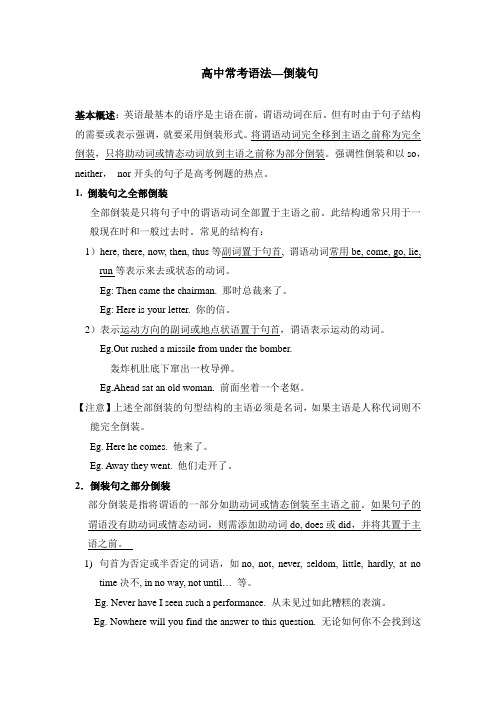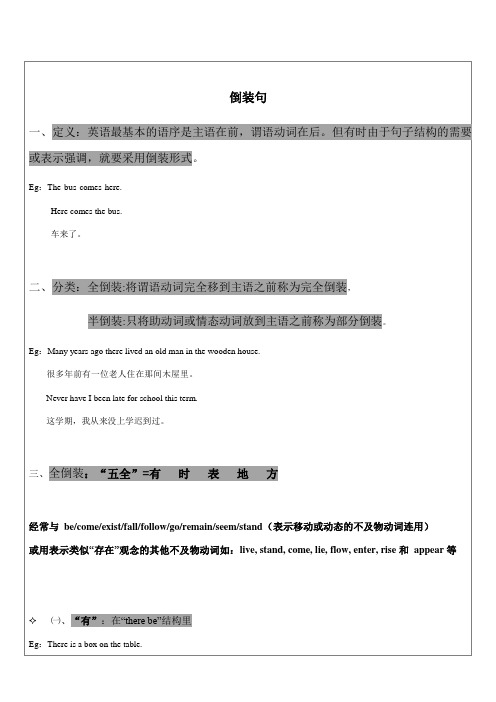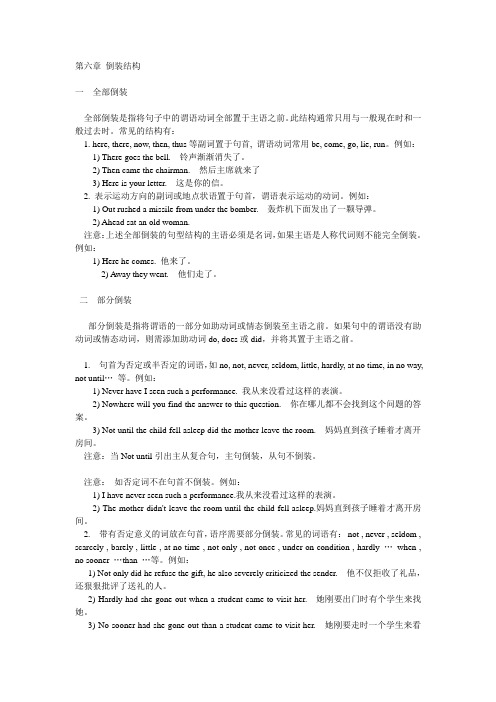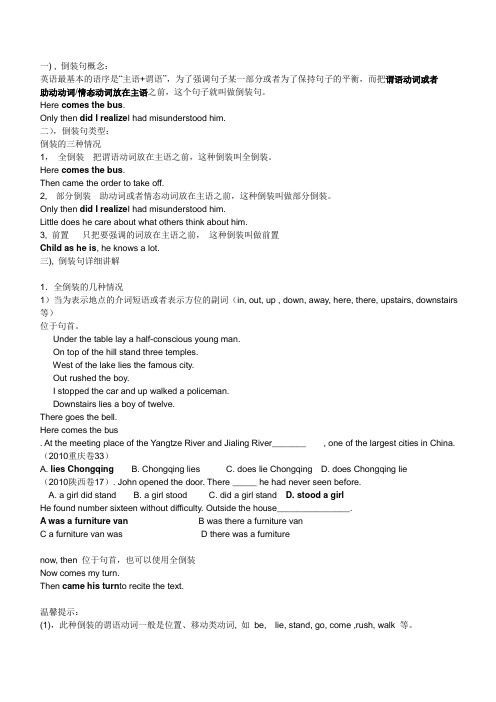倒装句讲解及练习
高考必考英语语法讲解及练习(含答案)——倒装句

高中常考语法—倒装句基本概述:英语最基本的语序是主语在前,谓语动词在后。
但有时由于句子结构的需要或表示强调,就要采用倒装形式。
将谓语动词完全移到主语之前称为完全倒装,只将助动词或情态动词放到主语之前称为部分倒装。
强调性倒装和以so,neither,nor开头的句子是高考例题的热点。
1. 倒装句之全部倒装全部倒装是只将句子中的谓语动词全部置于主语之前。
此结构通常只用于一般现在时和一般过去时。
常见的结构有:1)here, there, now, then, thus等副词置于句首, 谓语动词常用be, come, go, lie, run等表示来去或状态的动词。
Eg: Then came the chairman. 那时总裁来了。
Eg: Here is your letter. 你的信。
2)表示运动方向的副词或地点状语置于句首,谓语表示运动的动词。
Eg.Out rushed a missile from under the bomber.轰炸机肚底下窜出一枚导弹。
Eg.Ahead sat an old woman. 前面坐着一个老妪。
【注意】上述全部倒装的句型结构的主语必须是名词,如果主语是人称代词则不能完全倒装。
Eg. Here he comes. 他来了。
Eg. Away they went. 他们走开了。
2.倒装句之部分倒装部分倒装是指将谓语的一部分如助动词或情态倒装至主语之前。
如果句子的谓语没有助动词或情态动词,则需添加助动词do, does或did,并将其置于主语之前。
1)句首为否定或半否定的词语,如no, not, never, seldom, little, hardly, at notime决不, in no way, not until… 等。
Eg. Never have I seen such a performance. 从未见过如此糟糕的表演。
Eg. Nowhere will you find the answer to this question. 无论如何你不会找到这个问题的答案的。
高中英语 高三复习倒装句资料 含讲义和练习、答案

倒装句:“NAOSHI” 原则一、什么是倒装:有时由于句子结构的需要或表示强调或方便上下文衔接,要采用倒装形式。
主+ 谓------------- 自然语序谓+ 主------------- 完全倒装助动词/系动词/情态动词+ 主+ 谓------------- 部分倒装(半倒装)强调部分+ as + 主+ 谓------------- 形式倒装举例:1. The bus is coming here!倒装:Here comes the bus! (名词作主语)2. Our school lies north of the river.倒装:North of the river lies our school.二、“闹事N A O S H I”原则详解:N: 助动词/系动词/情态动词+ 主语+ 谓语(半倒装)1. 否定副词置于句首,句子部分倒装,( 如never, nor, not, hardly, hardly...when, no sooner...than, little, seldom, scarcely, rarely等)Hardly do I think you will make it.Not until midnight did it stop raining.Not only should we not be afraid of difficulties, but we should try our best to overcome them.2. 表示否定意义的短语置于句首,部分倒装,( 如at no time, under/in no circumstances, in no case, by no means,on no condition 等)By no means should you tell him about it. 你绝不要告诉他这事。
A : 形式倒装(前置)As/though引导的让步状语从句:只把强调的内容提到句首,主谓不用变化。
高中英语倒装句讲解以及习题(附答案)

桌子上面有一个盒子。
✧㈡、“时”:表示时间副词,如:now,then,
Eg:Now comes your turn.
现在轮到你了。
✧㈢、“表”:表语放句子前,“表语+系动词+主语” 的结构
Eg:Present at the party were Mr. Green and many other guests.
格林先生和其他的客人在这个聚会上。
Seated on the ground are a group of young men.
一群年轻人坐在了地上。
✧㈣、“地”:地点状语放在句首
Eg:In south of the river lies a small factory.
小工厂位于河的南方。
From the valley came a cry.
山谷传来一阵哭声。
✧㈤、“方”:表方位的副词here, there 或out, in, up, down, away, off 等标志词放在句首 Eg:There lies a large wheat field in front of the house.
房子前面有一大片麦田。
Off all the lights went when I came in.
当我进来时,所有的灯都灭了。
四、半倒装:“八部”=不只让步也常需(虚)如此祝福✧㈠、“不”表示否定。
(完整版)倒装句精讲及练习(含答案)

倒装句的用法英语倒装句分为两种:1、整个谓语在前的句子,叫完全倒装。
Here comes the car.2、部分谓语(情态动词、助动词、连系动词)在前,谓语的主体部分仍在主语之后的句子,叫部分倒装句。
Only then did he realize that he was wrong.必须弄清的两点:①若有主从句,哪句倒装。
②部分倒装还是完全倒装。
一、表示方位和时间的副词位于句首时(now ,then here ,there,out ,in ,up,down ,away ,back,off,on ), 句子全部倒装。
注:主语是代词时,不倒装。
(如 5,6)1.Here comes the bus .2.There goes the bell .3.Away went the students .4.Now comes the chance .Out rushed the children. he rushed.There comes the bus. 注意: 1.不能用进行时;he comes.2. 主语为人称代词时不倒装。
二、以介词短语表示的状语,提前位于句首时,全部倒装。
1.In a lecture hall of a university in England sits a professor .2.In front of our school stands a tower .3.By either side of the river grow a lot of apple trees .4.At the top of the mountain stands a temple .5. Among the goods are Christmas trees,flowers and toys.三、表语位于句首时,倒装结构为“表语+连系动词 +主语”A:形容词 +连系动词 +主语例 1.Present at the meeting were Professor White,Professor Smith and many other guests. 例 2.过去分词 +连系动词 +主语Gone are the days when they could do what they liked to the Chinese people.四、将 so\neither \nor 放在开头 ,表示“ 也 (不 )”的意思时 ,部分倒装注: 表示“确实是这样”时 ,不倒装1.He went to the film last night.So did I .2.You must finish your work ,so must I .3.She is interested in the story ,so am I .4.He didn ’ t turn up .Neither did his brother .5.His mother told him not to go to the film .So he did.五、在 if 条件 :在 if 条件句中 ,通常可以省略条件句 ,必须含有系动词if , 而将从句倒装were,助动词had 和情态动词should1.Were he younger(=If he were younger ),he would learn skating .2.Should they forget (=If they should forget ) to bring a map with them ,they would get lost inthe woods .3.Had they realized (=If they had realized ) how important the task was ,they wouldn ’ t have refused to accept .4.Were I you ,I would help her .六、否定词或半否定词(never .little ,seldom ,not ,nowhere ,scarely ,few ,by no means ,at no time ) 位于句首 ,应部分倒装1.Never have I been there .2.Little did I know about it .3.Seldom did she come late to school .4.Not a single mistake did he make .5.By no means should you buy that kind of car .七、以 not until,no sooner than , hardly when ,not only but also 所引导的状语放在句首时 ,需要部分倒装1.Not until 10 ’clock will the library open .2.No sooner had I gone out than he came to see me .3.Hardly had the train arrived when I ran to meet my friend.4.Not only does she speak English but also she follows the British way of life .八、 only及其修饰的状语位于句首时,后面的句子部分倒装。
倒装句讲解+练习

第六章倒装结构一全部倒装全部倒装是指将句子中的谓语动词全部置于主语之前。
此结构通常只用与一般现在时和一般过去时。
常见的结构有:1. here, there, now, then, thus等副词置于句首, 谓语动词常用be, come, go, lie, run。
例如:1) There goes the bell.铃声渐渐消失了。
2) Then came the chairman.然后主席就来了3) Here is your letter.这是你的信。
2. 表示运动方向的副词或地点状语置于句首,谓语表示运动的动词。
例如:1) Out rushed a missile from under the bomber.轰炸机下面发出了一颗导弹。
2) Ahead sat an old woman.注意:上述全部倒装的句型结构的主语必须是名词,如果主语是人称代词则不能完全倒装。
例如:1) Here he comes. 他来了。
2) Away they went.他们走了。
二部分倒装部分倒装是指将谓语的一部分如助动词或情态倒装至主语之前。
如果句中的谓语没有助动词或情态动词,则需添加助动词do, does或did,并将其置于主语之前。
1.句首为否定或半否定的词语,如no, not, never, seldom, little, hardly, at no time, in no way, not until…等。
例如:1) Never have I seen such a performance. 我从来没看过这样的表演。
2) Nowhere will you find the answer to this question.你在哪儿都不会找到这个问题的答案。
3) Not until the child fell asleep did the mother leave the room.妈妈直到孩子睡着才离开房间。
英语倒装句详解及练习

一) , 倒装句概念:英语最基本的语序是“主语+谓语”,为了强调句子某一部分或者为了保持句子的平衡,而把谓语动词或者助动动词/情态动词放在主语之前,这个句子就叫做倒装句。
Here comes the bus.Only then did I realize I had misunderstood him.二),倒装句类型:倒装的三种情况1,全倒装把谓语动词放在主语之前,这种倒装叫全倒装。
Here comes the bus.Then came the order to take off.2, 部分倒装助动词或者情态动词放在主语之前,这种倒装叫做部分倒装。
Only then did I realize I had misunderstood him.Little does he care about what others think about him.3, 前置只把要强调的词放在主语之前,这种倒装叫做前置Child as he is, he knows a lot.三), 倒装句详细讲解1.全倒装的几种情况1)当为表示地点的介词短语或者表示方位的副词(in, out, up , down, away, here, there, upstairs, downstairs 等)位于句首。
Under the table lay a half-conscious young man.On top of the hill stand three temples.West of the lake lies the famous city.Out rushed the boy.I stopped the car and up walked a policeman.Downstairs lies a boy of twelve.There goes the bell.Here comes the bus. At the meeting place of the Yangtze River and Jialing River_______ , one of the largest cities in China. (2010重庆卷33)A. lies ChongqingB. Chongqing liesC. does lie ChongqingD. does Chongqing lie(2010陕西卷17). John opened the door. There _____ he had never seen before.A. a girl did standB. a girl stoodC. did a girl standD. stood a girlHe found number sixteen without difficulty. Outside the house_______________.A was a furniture vanB was there a furniture vanC a furniture van wasD there was a furniturenow, then 位于句首,也可以使用全倒装Now comes my turn.Then came his turn to recite the text.温馨提示:(1),此种倒装的谓语动词一般是位置、移动类动词, 如be, lie, stand, go, come ,rush, walk 等。
高中英语倒装句(完整版详细讲义+随堂练习)

Grammar of the Inversion (Module 5 Unit 4)倒装句英语最基本的语序是主语在前, 谓语动词在后。
但有时由于句子结构的需要或表示强调, 就要采用倒装形式。
倒装分两种情况: 1)将谓语动词完全移到主语之前称为完全倒装, 2)只将助动词或情态动词放到主语之前称为部分倒装。
并且强调性倒装和以so, neither, nor开头的句子是高考例题的热点。
一、倒装句的意义1.用倒装构成疑问句,适应一定的语法结构的需要。
.in?Was the People's Liberation Army founded in 1927?2.为了强调某一部分, 而把这部分放到句首, 构成倒装。
t.fo.schoo.thi.term.So early did he come to school that no other students came.二、倒装的用法完全倒装1.在“ther.be”结构里, there是引导词, 主语在be后。
在“there + be”结构中的谓语动词有时不用be , 而用表示类似“存在”观念的其他不及物动词。
如: live, stand, come, lie, flow, enter, rise 和appear等。
e.g.Ther.i..bo.o.th.table.There came shouts for help from the river.There lies a large wheat field in front of the house.Many years ago there lived an old man in the wooden house.2.为了表达生动, 有时把表地点、方位的副词, 如here, there, now , then,, thus ,up, down, out, off, over, away, in等放在句首, 同时把谓语动词放在主语之前, 在here, there等副词开头的某些句子里(要用一般现在时态)。
(完整版)倒装句全面讲解和练习(答案)

(完整版)倒装句全面讲解和练习(答案)初中英语倒装句(一)倒装句的意义1、适应一定的语法结构的需要,主要是指疑问句句型结构的需要。
E.g. Was the People’s Liberation Army founded in 1927?2、为了强调某一部分,而把这部分放到句首,构成倒装。
e.g. Never have I been late for school this term.(二)倒装的使用情况一、部分倒装:就是把谓语中的be动词、助动词或情态动词置于主语前面。
常见于下列几种情况:(一). only所修饰的副词,介词短语或状语从句放在句首时,要用:only+ 状语+ be /助动词/情态动词+主语及其他例如:Only when he told me the news did I know what had happened.注意:only修饰主语时,不需要倒装。
例如:Among all the people, only you know the truth.小试牛刀:Only in this way ________to make improvement in the operating system.A. you can hopeB. you did hopeC. can you hopeD. did you hope(二).含有否定意义的副词或连词放在句首时。
如:never, little, seldom, not, not only, not until, no sooner (…than), hardly (…when), rarely, scarcely, in no way等。
例如:We seldom get up at four in the morning.= Seldom do we get up at four in the morning.Not a single word from him could express his feelings.(1) hardly…when; scarcely…when…; no sooner…than… 可以用正常语序had hardly done when… did 或用倒装句式Hardly had +主语+ done when… did 句式。
- 1、下载文档前请自行甄别文档内容的完整性,平台不提供额外的编辑、内容补充、找答案等附加服务。
- 2、"仅部分预览"的文档,不可在线预览部分如存在完整性等问题,可反馈申请退款(可完整预览的文档不适用该条件!)。
- 3、如文档侵犯您的权益,请联系客服反馈,我们会尽快为您处理(人工客服工作时间:9:00-18:30)。
倒装句英语句子的语序通常是主语在前,谓语在后,这种语序称作正常语序或自然语序。
但有时出于语法或达到某种修辞目的(强调、承上启下、平衡等)的需要,要把谓语动词放在主语前面,这种语序称作倒装(Inversion)语序。
将谓语动词完全移至主语之前,称完全倒装(Full Inversion);如果只是把助动词或情态动词放在主语之前,称为部分倒装。
1. there be结构的倒装在“there be”(或there + appear to be,come,exist, happen to be, lie, live, occur, remain, seem, seem to be, stand, used to be) 等结构中,倒装形式为完全倒装。
如:There were many students in the reading room in this evening.There is a TV set, a stereo system and a number of chairs in the sitting room.There seems to be a lack of communication.There remained a few jobs still to be finished.There stand a line of guards in front of the gate.2. here,there,now,then,thus等引起的倒装在以here, there, now, then等简短副词引起的句子中(前三个须用一般现在时),动词往往是be, come, go, run, lie 等,这类句子大多带有引起注意的含义。
如:Here comes the bus.公共汽车来了。
Here is the letter you have been looking forward to.你久盼的信在这儿。
There goes the bell.但要注意:如果主语是代词,则不用倒装。
如:Here they are. 他们在这儿。
3. 省略if的非真实条件状语从句中的倒装在虚拟结构中,条件从句的谓语含有were,had 和should这三个词是,可省去if,将这些词移至主语之前。
Had I time (= If I had time),I would go and help you.Were I you (= If I were you),I would go abroad.Should he come (=If he should come),tell him to ring me up.Had you worked harder at college, you would have got better job.Were he better qualified, he would apply for the position.4. 副词so,neither,nor等引起的倒装在用so, nor, neither表示“也/不……”这一类结构里其公式是:肯定: so + be / have/助动词/情态动词+主语否定: Neither(nor)+be/have/助动词/情态动词+主语。
如:—He has been to Beijing.他去过北京。
—So have I.我也去过。
—They can’t answer the question.他们不会回答这个问题。
—Neither than I.我也不会。
5. what,how引起的倒装以What, how开头的感叹句(表语或宾语提前)。
如:What beautiful weather (it is)! 多好的天气啊!(表语提前)What a lovely picture he painted!他画了一张多好的画啊!(宾语提前)6. 疑问词或连接词引起的倒装在疑问词或连接词whether等引起的从句中。
如:Whatever you may say, I won’t go there.无论你怎样说,我都不会去那儿。
(状语从句中宾语提前)What book he wants is not clear. 他要什么书还不清楚。
(主语从句中宾语提前)7. 否定词位于句首时引起的倒装(1). never,seldom,hardly,little,few等引起的倒装否定词never,seldom,rarely,hardly,barely,scarcely,little,few等位于句首时所引起的倒装句通常为部分倒装形式,如果谓语动词为be的一般现在时或一般过去时,则为完全倒装形式。
如:Never shall I forget the days when you were with us.Little does he realize how important this meeting is. 他对这个会议的重要性不甚了了。
Never/Seldom has there been so much protest against the Bomb.(2). nowhere,no longer,no more等引起的倒装nowhere(无处),no longer(不再),no more(也不)等否定词位于句首时所引起的倒装句通常为部分倒装形式,如果谓语动词为be的一般现在时或一般过去时,则为完全倒装形式:No longer was he in charge of this work.他不再负责这项工作了。
Nowhere is drug abuse more of a problem than in the US.'She didn't know the reason for his leaving.' 'No more do I (=neither do I).'(3). not until,not a,not in the least等引起的倒装not until(直到……才),not a(一个……也没有),not in the least(一点儿也不),not for a minute/momen t(一点儿也不)等位于句首时,通常引起倒装(not a之后的名词作主语时除外),其形式通常为部分倒装形式,如果谓语动词为be的一般现在时或一般过去时,则为完全倒装形式。
如:Not until all the demands had been turned down did the workers decide to go on strike.一直到所有的要求遭到拒绝之后,工人们才决定罢工。
Not once did he talk to me. 他一次也没有和我谈过。
Not a word did he say.他一句话也没说。
Not in the least am I afraid of you any more.(4). under no circumstances,by no means,in no way,at no time等引起的倒装in/under no circumstances (无论如何不),by no means (决不),in no case (无论如何不),in no way (决不),on no account (决不可),on no condition(决不),at no time(永不..., 在任何时候都不)等短语位于句首时所引起的倒装句通常为部分倒装形式,如果谓语动词为be的一般现在时或一般过去时,则为完全倒装形式。
如:In no case must force be resorted to. 决不准许诉诸武力。
By no means is it true that all English people know their own language well. 绝非所有的英国人都通晓本国语。
At no time did anyone involved speak to the press.Under no circumstances would he change his mind.Under no circumstances should you lend him any money. 你无论如何都不该把钱借给他。
On no account must you accept any money if he offers it. 他如要给你钱,你可绝不能接受。
In no case should you give up. 你绝不能放弃。
On no condition should we tell her about it. 我们绝不能把此事告诉她。
No way will I go on working for that man. 我再也不给那个人工作了。
8. 关联连词位于句首时引起的倒装(1). not only...but also引起的倒装not only...but also位于句首所引起的倒装句为部分倒装形式,如果谓语动词为be的一般现在时形式或一般过去时形式,则为完全倒装形式。
如:Not only should we not be afraid of difficulties, but also we should try our best to overcome them.我们不仅应该不怕困难,而且应该尽最大努力去克服它们。
Not only did he come, but he saw her. 他不仅来了,而且还见到了她。
Not only does she speak Spanish, (but) she also knows how to type.她不但会说西班牙语,还会打字呢。
Not only is he a teacher, but he is also a poet. 他不仅是一位教师,而且是一位诗人。
Not only did he speak more correctly, but he spoke more easily. 不仅他讲得更正确,也讲得更不费劲了。
Not only did they present a musical performance, but they also gave a brief introduction to the history of Western brass instruments. 他们不但做了音乐表演,而且简短地介绍了西方铜管乐器的历史.(2). neither...nor引起的倒装neither...nor位于句首引起的倒装句为部分倒装形式,如果谓语动词为be的一般现在时或一般过去时,则为完全倒装形式。
